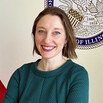Robina Foundation Human Rights Fellowship
"All human beings are born free and equal in dignity and rights. They are endowed with reason and conscience and should act towards one another in a spirit of brotherhood."
From the Universal Declaration of Human Rights (art. 1), adopted by the UN General Assembly resolution 217 A (III) of December 10, 1948
For many young lawyers, working in human rights is more of a calling than a career, but financial pressures and the challenges of acquiring the experience needed for the limited number of jobs in the field often interfere with that calling.
The Robina Foundation Human Rights Fellowship Initiative at Yale Law School helps address this problem. Established in 2008, it funds four types of scholarships and fellowships that build on the strengths of the Law School’s human rights program.
For recent graduates, the Robina Foundation Post-Graduate Human Rights Fellowship provides an opportunity to work full time in human rights for up to a year. Fellows have had the opportunity to start their human rights careers in such settings as the appeals chambers of the International Criminal Tribunal for the Former Yugoslavia, the Office of the Prosecutor at the International Criminal Court, the chambers of justices on the South African Constitutional Court, and U.N. and U.S. government agencies concerned with human rights.
Each year, the Orville H. Schell, Jr. Center for International Human Rights hosts the Robert L. Bernstein International Human Rights Symposium, during which current and previous Bernstein and Robina fellows return to the Law School to share insights from their experiences. The symposium helps foster a strong network of human rights practitioners at various stages in their careers. Returning fellows, current students, and prospective fellows have a chance to interact with each other, as well as with leading scholars and advocates, discussing effective approaches to the defense of human rights and emerging issues in the field.
Scarlet Kim ’11
International Criminal Court, The Hague, The Netherlands
Scarlet Kim’s Robina Fellowship supports her work in the Legal and Enforcement Unit of the Presidency at the International Criminal Court (ICC) in The Hague. She has contributed to the Presidency’s review of administrative decisions, assisted the Presidency with the process of amending the Rules of Procedure and Evidence, and assisted the Presidency in creating a plan for enforcing the sentences of convicted defendants.
In her mid-year report, Kim wrote: “Working at the Presidency has been a fascinating and rewarding experience. It has allowed me to deepen my understanding of multiple areas of law, including international criminal procedure, international human rights law, and treaty law, all while honing my core legal skills.”
A highlight of her work was participating in negotiations with a State Party to the Rome Statute that established the ICC on a potential bilateral agreement on the enforcement of sentences. “The hands-on nature of this experience taught me a tremendous amount both with respect to law (e.g., types of tensions between the Court’s legal framework and domestic law and policy) and diplomacy (e.g., when the Court should and should not accede to the demands of a State Party),” Kim said.
Kim was awarded an extension grant for her fellowship from the Law School’s Orville H. Schell, Jr. Center for International Human Rights and recently accepted a full-time position at the ICC as an Associate Legal Adviser in the Presidency.
Julie Hunter ’13
European Court of Human Rights, Strasbourg, France
Julie Hunter’s Robina Fellowship work has been at the European Court of Human Rights. Her responsibilities included drafting judicial opinions, concurrences, and dissents for Judge Andra´s Sajo´, as well as conducting legal research and writing reports on comparative law for the research division of the court.
Hunter wrote in her mid-year report that the experience has provided “broad training in an international court setting and exposed [her] to the practice of Convention human rights in the European system.” In particular, she wrote, “Clerking with Judge Sajo´ has involved drafting and legal research for Hungarian cases at the seven-judge Chamber level of the Court, as well as work on cases for the Grand Chamber (the Court’s highest appellate body).” She and Judge Sajo´ have collaborated on an academic article about whether there is a political ques- tion doctrine at the European Court of Human Rights.
Topics of her research have spanned all articles of the European Convention on Human Rights, as well as refugee law, genocide law, and jurisprudence on youth-related issues and internet technology. Hunter wrote that she has “been able to attend most of the Court’s public hearings of Grand Chamber cases ... (including cases involving Finnish transsexual marriage rights, the practice of caging defendants in Russian courtrooms, plea bargaining in Georgia, the French burqa ban case, and a case involving the treatment and return of migrants to Italy).”
Like Kim, Hunter was awarded a fellowship extension from the Schell Center that has allowed her to move from the Court to the Office of the Commissioner of Human Rights at the Council of Europe, where she will work until December 2015.
“The Robina Fellowship has allowed me to gain training and access to one of the most effective human rights institutions in the world. Without support from the Fellowship, I would not have had the invaluable experience of learning and practicing human rights with lawyers and advocates from forty-seven different countries, surrounded by different languages and cultures, working to understand the complex human rights problems which Europe and the world face in the twenty-first century.”


